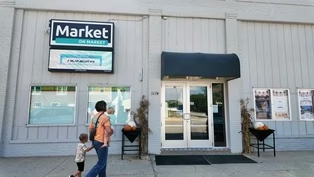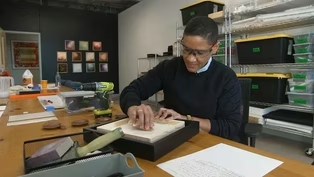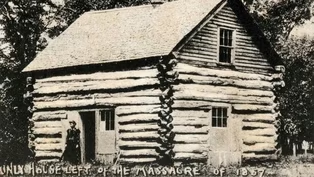
Iowa Lakeside Laboratories History and Modern Day Research on Blanding Turtles In Okoboji
Clip: Season 3 Episode 302 | 6m 43sVideo has Closed Captions
Iowa Lakeside Laboratories was founded for the purpose of studying nature in nature.
Iowa Lakeside Laboratories is a regents' biological field school, founded by Thomas MacBride for the purpose of studying nature in nature. Today scientists and students continue to live out his legacy.
Problems playing video? | Closed Captioning Feedback
Problems playing video? | Closed Captioning Feedback
Iowa Life is a local public television program presented by Iowa PBS

Iowa Lakeside Laboratories History and Modern Day Research on Blanding Turtles In Okoboji
Clip: Season 3 Episode 302 | 6m 43sVideo has Closed Captions
Iowa Lakeside Laboratories is a regents' biological field school, founded by Thomas MacBride for the purpose of studying nature in nature. Today scientists and students continue to live out his legacy.
Problems playing video? | Closed Captioning Feedback
How to Watch Iowa Life
Iowa Life is available to stream on pbs.org and the free PBS App, available on iPhone, Apple TV, Android TV, Android smartphones, Amazon Fire TV, Amazon Fire Tablet, Roku, Samsung Smart TV, and Vizio.
Providing Support for PBS.org
Learn Moreabout PBS online sponsorship♪♪ ♪♪ [Mary Skopec] Iowa Lakeside Laboratory is an Iowa Board of Regents field biological campus purchased in 1909 by Thomas Macbride.
Was just a few acres to start with, right on the shoreline of West Okoboji, for the study of nature in nature.
When students first came here in 1909, they stayed in canvas tents.
They grew their own vegetables, they fetched their own water, and they really were completely outside all of the time.
In the late 20s, they gifted the property to the state of Iowa under the understanding that it would always maintain the same mission and purpose.
Over time, the Civilian Conservation Corps has built laboratories, and so the stone labs provided that shelter for students to do experiments and kind of get out of the elements.
And those are all on the National Historic Registry.
Lakeside's considered a National Historic District, so the entire grounds are considered historic.
I think of us as the crossroads between state park, museum and educational facility.
Over time we've added 147 acres.
The campus basically wraps around little Millers Bay of West Okoboji.
And that allows us to have everything from native prairie, restored prairie to woodlands, to wetland areas, the shoreline, the lake itself.
♪♪ ♪♪ Drew Howing is a professor at Iowa Lakes Community College, and he's been working on a research project looking at Blanding's turtle, which are an endangered or threatened species of turtle in Iowa.
[Drew Howing] Our main priority and goal is to try to catch and learn more about the Blanding's turtles that are living at this site.
If you want to just walk out to that hill and just listen to see if maybe she's moved into this creek.
They travel a lot more over land and walk further away from their aquatic habitat to nest, laying their eggs in corn and soybean fields.
We're trying to monitor those with telemetered animals to get an idea on the success of those nests.
They both found in the wetland?
[Man] Yeah, both in the wetland.
133 seem to be right over there.
[Howing] Our focus over the next two weeks is to try to detect nesting females and find where they're laying their eggs so we can then monitor those into the fall.
You can take your fingers right here, and I can feel she's chock full of eggs.
She's just fitted with a radio here that is used with an epoxy put on the back of her shell.
She's at least 14.
[Katherine Shepherd] When I got here, I didn't know how to conduct a lot of field research, and I didn't know the different protocols of different types of field research.
It was really interesting to be in the marsh and picking up the turtles as we went -- -- like 3.75 -- -- checking in on them and just learning more about them as we had them in our hands.
[Man] There I just heard it.
I'm hearing it.
This is mine.
[Shepherd] We all are able to work together even though we don't always know what's going on.
We're kind of figuring out how to do field research as a team.
I'll be better at problem solving when I'm doing my own research in the future.
Being out in the field really connected me to the project.
[Howing] But I swear I felt eggs in there.
[Man] I think she does.
[Howing] We're gonna want to just check on her while we're checking on 083 down here.
[Man] Awesome.
♪♪ [John Doershuk] We're at the Abbie Gardner Historic Site in Dickinson County, Iowa, on the shores of West Okoboji Lake.
We're here today because I'm teaching in archaeological field school for four weeks at Iowa Lakeside Laboratory.
♪♪ One of the objectives of the archaeological field school is to give the students experience, training and methods.
What they actually discover is not necessarily as important as just getting the experience of how to identify things in the field, record the data so it's useful for subsequent use by other researchers and help build the archaeological knowledge base.
♪♪ [Doershuk] What are you getting?
[Girl] Piece of bone.
[Doershuk] One thing I like about doing an archaeological field school at Iowa Lakeside Lab is the opportunity to interact with lots of other scientists, interns, and students all coming here to really nerd out on their own science.
And it's a time when we can just relax and science first and all other concerns second.
I feel it's a place where I can share my expertise with students who are interested in the field, more interested in just being willing to show up in the classroom or on an online zoom, but to actually make the commitment to be here and do the hard work that's involved in field archaeology.
[Avery Domino] They're hot days, they're long days, but it's very rewarding work.
The point, of course, is the process and not actually finding things, but having the moment where you're like, oh my gosh, I've just found another nail or a button or a chert flake.
Truly, time flies.
We'll show up here early in the morning and then all of a sudden Dr.
Doershuk is saying, hey, it's time to go to lunch.
♪♪ [Skopec] I think that the students are really completing who they are as people here.
We get them out of the classroom, into the field so that they really understand what a professional will be doing.
And it just helps them put all the pieces together.
One of the things our students are doing are asking questions about how to protect these resources long term.
Their research is very focused and practical to the questions that people ask me every single day.
Are the lakes getting better?
What's going to happen in the future?
And we're able to answer those questions with our students in a really practical way that helps people here make better decisions.
I think we're all richer by having an educational facility that's focused on Iowa questions and on the Iowa environment.
♪♪
Gowrie’s Market on Market: Community Support Keeps Grocery Store Alive in Rural Iowa
Video has Closed Captions
Clip: S3 Ep302 | 6m 41s | In Gowrie, a town of 900, the local grocery thrives due to creative thinking and community support. (6m 41s)
How Artist Jill Wells Uses Braille to Make Art Accessible for Everyone
Video has Closed Captions
Clip: S3 Ep302 | 6m 3s | For Des Moines-based artist Jill Wells, her artwork is purposely tactile for accessibility. (6m 3s)
March 1857 Spirit Lake Massacre Explained by Historian Kevin Mason
Video has Closed Captions
Clip: S3 Ep302 | 5m 23s | Historian Kevin Mason recounts the events of March 1857, known as the Spirit Lake Massacre. (5m 23s)
Providing Support for PBS.org
Learn Moreabout PBS online sponsorshipSupport for PBS provided by:
Iowa Life is a local public television program presented by Iowa PBS
















